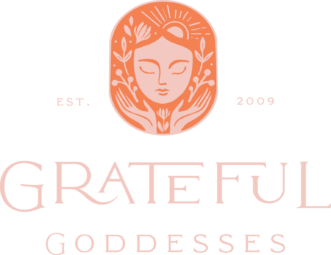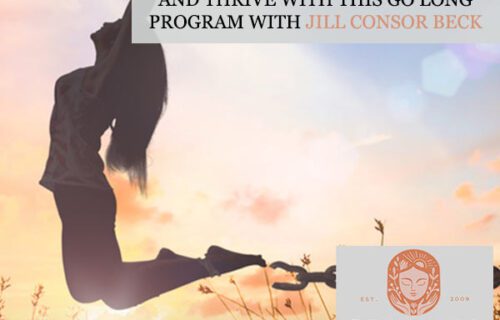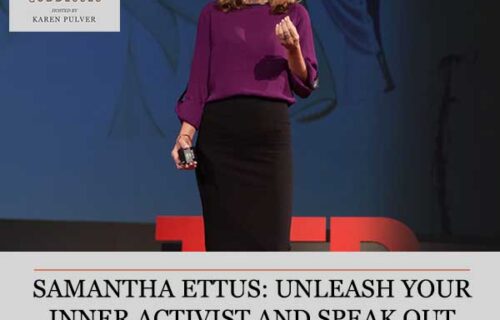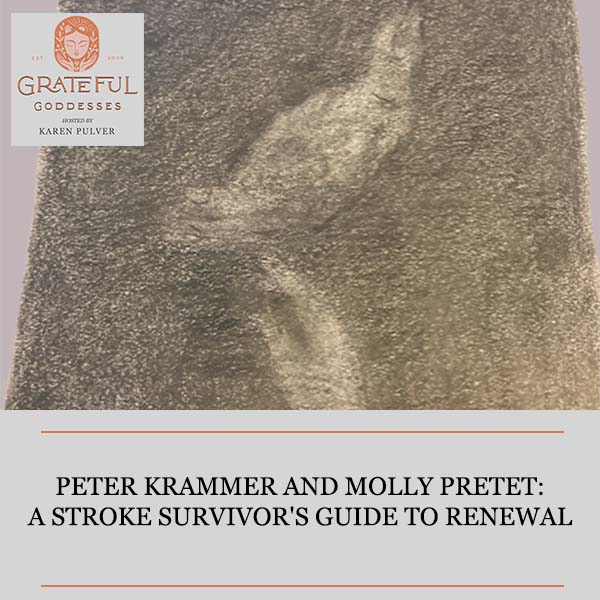
Peter Krammer And Molly Pretet: A Stroke Survivor’s Guide To Renewal
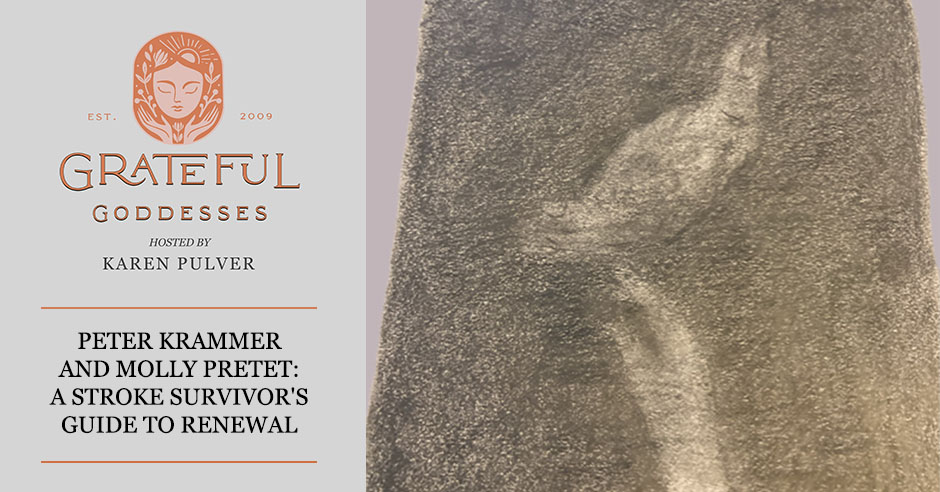
In this episode of the Grateful Goddesses podcast, host Karen Pulver shares her personal journey as a stroke survivor. Back in February 12, 2023, Karen experienced a life altering stroke that changed her perspective on life. In this inspiring episode, Karen interviews fellow stroke survivor Peter Krammer and stroke support coordinator Molly Pretet.
During the conversation, Karen and Peter discuss their individual experiences with stroke and the challenges they have faced in moving forward. They shed light on the fact that stroke can be an invisible illness, emphasizing the importance of raising awareness about this condition. Both Karen and Peter share their out-of-body, spiritual like experiences following their strokes, which surprisingly had similarities. These experiences enabled them to find calmness and view life from a different perspective.
The episode also offers practical suggestions for stroke survivors on what they can do now, focusing on the possibilities rather than the limitations caused by the stroke. The hope is that listeners and viewers will be inspired to listen to their bodies, give themselves grace and space to heal, and know there is always support available when needed.
Tune in to this episode of the Grateful Goddesses podcast to gain insight, inspiration, and a renewed sense of hope in the face of adversity.
To note, the images seen on this blog were done by Peter Krammer. These are his sketches after his stroke.
—
Watch the episode here
Listen to the podcast here
Peter Krammer And Molly Pretet: A Stroke Survivor’s Guide To Renewal
My Talk With Fellow Stroke Survivor Peter Krammer And Stroke Support Group Coordinator Molly Pretet
Welcome everyone to our second episode for 2024. This is a very important topic to me. It’s something very personal. I did mention in our first episode that the reason why I was on a hiatus for almost a year was because I suffered a stroke. In this episode, I’m going to talk more in detail about that. I have a fellow stroke survivor on as well. We’re going to have a conversation. I met Peter at a stroke support group virtually where we connected. We’re going to share our stories as well as share some things that at least I feel and perhaps Peter feels are good ways to talk to people who have been through various strokes, as well as caregivers. Welcome, Peter. Thank you so much for coming.
I appreciate being here. Thanks for the invite.
This is our second episode and I took such a long break because I needed to rehabilitate. I started on my body more than my mind. I let my mind go a little bit and maybe that’s a bad thing, I don’t know. I spent 2023 focusing on getting strength and coordination again. I was falling a lot and all of that. I’m curious if you could share your stroke story and then how you’ve been rehabilitating.
I had a stroke back in February of 2022 and it started with an aneurysm. I had a brain aneurysm. I knew something was wrong. I felt strange. Suddenly, I got a headache and it was excruciatingly painful. I had my wife call 911 and they sent me out over to Edward. I was at Edward Hospital for about a week. At the time, they stopped the bleeding and put stints in my head. Those little buggers worked for about a week. They raised my blood pressure. It’s a standard procedure.
The point is it was the reason why the second stint didn’t hold and I ended up having a stroke. It was one of those deals where they were like, “We’re going to take a shot and try to stop the bleeding by cutting the blood supply off, hoping there’s no stroke. If we don’t do that, we’re going to lose this guy.” They took the shot and here I am. When I woke up at Edward, I was numb on one side of my body. My left side was affected.
My speech was fine. I could carry on conversations but as far as where I was and what had happened, I didn’t know. I had no idea. I went to Shirley Ryan after that and spent nine weeks in the city. They did a fantastic job. I was pleased with, 1) The amount of time they gave me and, 2) The amount of progress I was making to get back to normal. As a stroke survivor, even though it’s been a few years, I still don’t feel like I did before all this happened. It’s caused some typical depression that is often the case with stroke survivors. That’s what I understand.
It’s a sense of loss. It’s like I lost my freedom and ability to do what I want to do when I want to do it. I have to rely on my wife about all the time, my son, and my daughter. Luckily, I’ve been blessed. I couldn’t imagine what the comeback would be like over the last couple of years if my support group was not there and the family was not there. They’ve been above and beyond fantastic. Caregiving takes its toll on the entire family. Stroke’s effect is not just on the patient but also on the family.
Depression is often the case with stroke survivors as it’s a sense of loss, lost freedom to do what you want to do when you want to do it. Share on XIt’s important to acknowledge that because that support group is so necessary. They’re often overlooked. That’s about it in a nutshell. I glanced over it quite a bit. I had brushes with death while at the hospital. I got serious pneumonia. It’s been a tough road, I have to tell you. Somebody told me back when I was still at Edward, “This is a marathon, not a sprint. Take your time.” They were talking to me, who was never built for marathons and never ran a marathon. The most I did was watch the finish of marathons on television but I had no idea it would be like this. It’s a long road. I was 57 when I had my stroke.
Strokes affect the patient and the family and caregiving can take its toll. Recovery is a marathon, not a sprint. Share on XI had my stroke on February 12th, 2023. I’ll never forget that day. I’ll tell the audience a little bit about what happened to me. I was in good shape and healthy I thought. I couldn’t believe that this happened to me. It was like a struck-by-lightning kind of feeling. I don’t know. I was feeling a little uncomfortable the morning that it happened. I was out of breath. My right arm was tingly.
I had plans with my husband to go to this nice lunch. We were in New Orleans visiting my daughter. I wasn’t that hungry and I had some coffee. We went to lunch at 2:30. When we were walking there, I knew I was out of breath and I couldn’t handle it. I was like, “We need to Uber.” “No, let’s walk.” Something was off but I thought maybe I was just not feeling good or getting a cold.
While we were sitting there at lunch, thank goodness, we didn’t have our food yet. My face was on my hand talking to my husband. The next thing I knew, I collapsed. My head bopped a couple of times and landed flat on the table. The difference between you and I though, Peter, is that I was fully alert. I was locked in, which I’ve discovered can happen to stroke victims. I didn’t faint. I knew everything that was going on. I didn’t know what was happening but I couldn’t move. I was on the table with my hair in my face and grunting.
My head was spinning like, “What is happening to me?” It was like a little person saying, “Move, Karen.” I couldn’t move. My husband thought I maybe fainted because I didn’t eat. Luckily, there were two nurses sitting at a table nearby who came rushing over and were like, “We’re emergency room nurses. We think she might be having a stroke.” Thank goodness, they told him that because he was going to give me orange juice, which I could have choked on. My tongue was everywhere.
They rushed me to the hospital. I felt the IV going in. My arm was back. I kept thinking, “Please, move my arm normally. It’s going to break.” My body was paralyzed like that. I couldn’t move for about five hours. During that time, I heard everything. I was being rushed in to do all these different tests and scans. I heard all the stuff around me. I heard the nurses talking about as they were removing my jewelry for the scan what they did last night, the night before they went on a date.
Note to people who are reading or in the healthcare field, even if your patient may not be talking, they are alert sometimes and they know what you’re saying. That’s what I want to tell people out there. It’s crazy. Eventually, they were going to give me a TPA, which is an injection to shrink the clots. They saw that 1 clot split into 2. I had a mid-brain bilateral stroke, which means my whole body was affected.
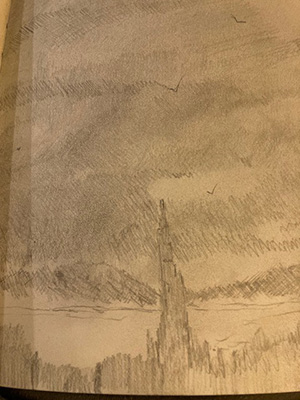
When they went to prepare for it, all I could do was lie there and think, “I’m dying.” I didn’t know. I went through the checklist, “Did I say I love you to my children? Did I speak to my parents?” I don’t know if you did that too. I had this very spiritual experience, which I’d love to share with the audience. I don’t tell many people but everyone’s going to know. It helped me to calm down and be centered. After that happened, my body cleared the clots.
What they tell me is it’s rare that that can happen but because I was in fairly good shape before the stroke, my body was able to fight it. I didn’t smoke or have diabetes. They kept me in the hospital for a few nights and they’re still trying to figure out how it happened. They think it was a clot that originated in my leg somehow, maybe by flying, and went up but I’m still trying to figure it out. You said, “I had experience spiritual-like as well.” Do you want to share that? I’ll then share mine.
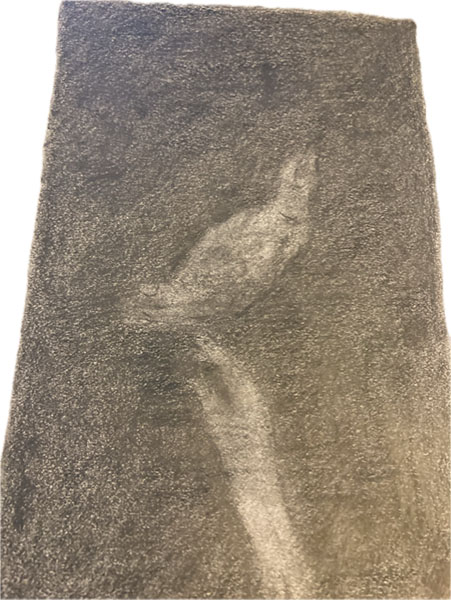
It’s something that I don’t like to bring up on an unsolicited basis because I’m not that way. My story was when I realized what had happened, I was shocked. I couldn’t believe it happened to me. I was depressed right off the bat. I’m lying there. I was at Shirley Ryan worried. I was thinking to myself, “How am I going to go back to work? Will they allow me to come back to work?” I ran an office for a large brokerage firm.
It’s imperative that anybody in a leadership position is okay because if something goes wrong legally, the investigators will always ask, “What was the person like? Was there anything that would lead us to believe that he was going to fall asleep at the wheel?” I was having a stroke and not being able to move. My left hand was still very inert. I was reeling and stressed.
I told the caregivers at the time, “If I snap at you, it’s not you personally. I’m trying to deal with all of this.” They suggested that I talk to somebody and I did. I kept feeling that way, no matter how much I talked to somebody. The anxiety was starting to build. I went to sleep one day. I had this dream and I don’t know what it was. I do know I wasn’t breathing heavily so I don’t know if it was a lack of oxygen or what but I was in a place. As the movies visualize or what quite often people will talk about, it didn’t look like that at all.
First of all, I could feel no more numbness, which is something I still deal with. I felt no deafness in one ear, which is something I still feel. My throat is a little scratchy because the stroke damaged my esophagus. I felt none of that. I was in this most peaceful place. I got immersed in the feel. Seeing anything wasn’t important. It was the feel. I had the hardest time articulating what that was like but at that point, that was the catalyst that got me to calm down and not worry about tomorrow. The focus is on today. Be calm and still. It was a great experience. It mostly felt visual. It was nothing to bring home.
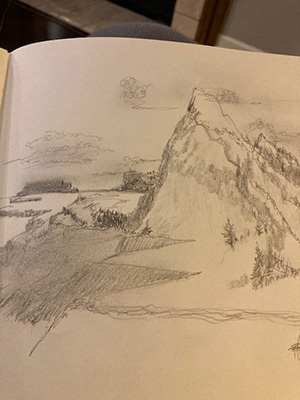
How soon did you have this? Did you have this during the stroke?
I don’t know if it happened during the stroke, and it’s something that I reflected on afterward, or if it did happen about a month after the stroke. I just remember that feeling and it was the most calming and awesome feeling. Unlike anything I’ve experienced in this realm, as they say, it was like love was in the air. I don’t know how to feel like that anymore. Not now, anyway. I don’t know. We’ll see.
I’ve not heard this story and I have to tell you, my experience was very similar. I was lying in the hospital in the emergency room and waiting for them to come back and give me the TPA injection. I was checking off all the boxes in my head. I couldn’t control anything except my breathing. I knew I would breathe and meditate because I knew how to meditate. I closed my eyes. I did that. All of a sudden, I felt not a place but a feeling of love.
It’s like when my kids used to do family trees and they do the parents and then the grandparents, great-grandparents, and all the ancestors. I felt like it wasn’t a specific person who’s passed on but it was all the people of my lineage, including friends who have passed all around me. I couldn’t see faces. I only felt their presence and heard a message. It wasn’t like a voice but it was this message saying, “You’re going to be okay. Calm down. It’s okay.”
“We’re waiting for you. Don’t be afraid. It’s not your time. You need to be there for your family. We’re always here and we’re always with you. If you ever need us, call us. We’re around you. When it is your time to go,” meaning die, that’s how I interpreted it, “It’s not going to be so bad because we’re all here and then you’ll be waiting for your loved ones to help them.”
That’s when my body woke up. It was very strange. The first thing that woke me up was my bladder. I started urinating in the bed. I couldn’t speak at the time. My husband was out on the phone. I started urinating and it started to get on the floor because this was all day of holding it in. My hands started moving slowly and then I started talking. Everything woke up.
I don’t tell people about that experience unless like in this situation. You also shared your experience. It was so surreal but it helped me. When I’m freaking out or have a PTSD moment, I close my eyes and remember that love and feeling. I don’t know if it was a near-death experience. The same as you, I was still breathing. My heart didn’t stop. It’s so interesting that you felt that way as well.
That is fascinating because I was always under the impression that it was going to be visual. You’d see people that you remembered and that you ran into during your life. To know that that was not part of it, on one hand, I was thinking, “Did I make it? Was I knocking on heaven’s door and they decided, ‘Don’t let that guy in. He’s got to go back.’” It was answered in the field at that moment.
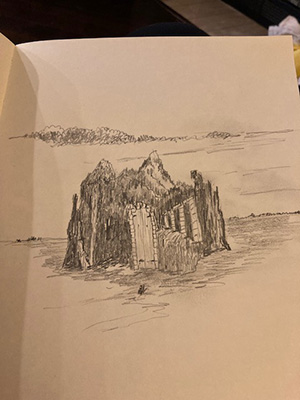
Every now and then, I’ll get to that point. I can sense there’s something there. It’s enlightening and refreshing. One thing that is interesting is I went from being someone that they had to plan and worry about, and my crew and the markets. I was someone who was paid to pay attention to uncontrollable forces. I try to manage those uncontrollable forces. What I learned through this experience is it doesn’t matter. It’s not important. It’s so easy to say that to people.
Unless you’ve experienced it, it’s hard. I still want to be in control though. I’m not at your level yet. I’d love to learn from you even though this happened to me and I knew I couldn’t control everything. “What could I control? What could I do?” I had that lovely spiritual experience. I still have moments where I get frustrated. I’ve been good with my physical but my mental processing and memory haven’t. I get so frustrated and angry. We’re joined here by Molly Pretet. She is going to share with us what she does. Go ahead, Molly. I’ll send it to you.
First of all, thanks for having me. I met Karen through a stroke support group that I host. I am a stroke coordinator at an area hospital. The stroke support group was started by my predecessor. I took it over when I started in this role with the goal to encourage people to come together and talk about what they’re going through because it can be helpful to know that you’re not alone in what you’re going through and also to make sure that you have the resources that you need. I’m providing a little bit of both in the group. Other than that, my background is I’ve been a nurse for about fifteen years. I worked a lot with stroke patients my whole career. That’s a little bit about me and why I’m here.
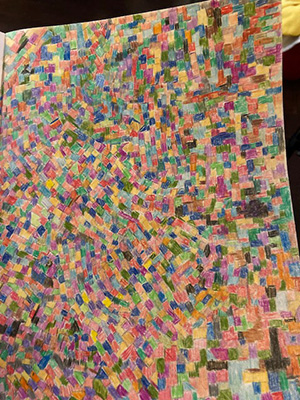
Molly, have you ever heard from other stroke survivors that they had spiritual-like experiences too like Peter and I have?
I feel like I have. I’ve heard patients talk about out-of-body experiences when they’ve had some insult to their brain or some other event but recalling that.
Stroke survivors can have out-of-body experiences as you have had an insult to the brain. Share on XWhat do you find in the groups that you’ve had is the hardest hurdle for stroke survivors to get over?
A couple of things like settling into a new life, a pivot of where they were, whatever their stroke has dealt them. It may not be a physical disability that has come out of it. It could be speech, concentration, and things like that, how they are managing their lives, and what that looks like. That’s a big part of it. The other thing that we see is their new life with having a caregiver. That looks very different from person to person.
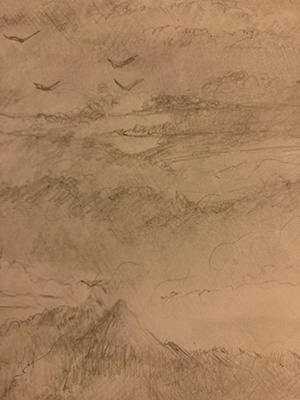
The biggest hurdle after a stroke is adjusting and pivoting to a new normal, suffering depression and a total lifestyle change. Share on X
They feel bad that their spouse is their caregiver and has to drive them places, help them get around, or whatever that might be. Those are the two things that I’ve seen. The other thing would be depression after a stroke. That goes along with those two things. We had a guest speaker come in 2023 who talked about that but that’s very common after a stroke and is very different from person to person of what that looks like. I see that a lot.
When I came on, I remember being nervous that I might be the youngest one there. I was lucky that it didn’t affect me as much as some other stroke survivors and I wasn’t sure if I’d be resented for that. I know that I wouldn’t be resented but would I still get the support I need? Peter, the last time we were on set, you were encouraging me. Maybe it was coaching that I was nervous about. You said, “No, you can do it.” Even that was so helpful to me and uplifting.
I encourage anyone no matter what level of stroke that you’ve been through. I suffered a brain injury of some sort. Even if it’s a little bruise, it’s still bad. It still changes your entire way of living. Talking about age, these are comments some people said and I want to ask you both what you think about it. “You are too young to have had a stroke. You don’t look like you had a stroke. You look better. Are you better now?”
“I relate because I get headaches. I feel tired too. It’s menopause. I’m going through menopause. I know someone who had a stroke and they ran a marathon. They got back to work. They could stand on their head. They can do so much. Why can’t you? You always seem fine when you’re with me. What could have been worse? You’re so lucky you had such a mild stroke.” Those are some things. What especially gets me is the point, “You look great. Why aren’t you feeling great?” What are your thoughts on that, Peter?
When I had clients who suffered from stroke or an associate had an issue, I could never relate. Looking back, I wasn’t even close to understanding what it was they were going through. I empathize with anyone who has a minor stroke to a severe debilitating stroke. I feel bad for them because it is a lifestyle change. You will walk away feeling like you’ve been robbed because you were.
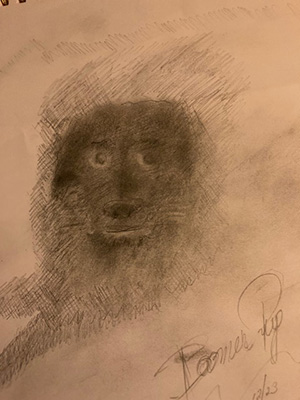
Some stroke survivors walk away feeling like them. We’re robbed, but maybe we are the LUCKY ones as we got a chance to have this experience, and we are still here, so we can look at life differently. Share on X
I’m going to give you my post-stroke pep talk. This world is broken. That’s the way it is. We were here that in a way, it was like, “Let’s see how this person who’s a blank slate is going to try to fix the broken world. Will they break too?” Maybe it’s all a test. When you have something like this thing happen with a stroke, a heart attack, or whatever the case may be, it could be cancers, those are big life-changing illnesses and yet that’s the way it is. It’s a broken world.
We’re probably the lucky ones because we got a chance. As I often thought about it, I was on a hamster wheel. Every day, I was going in and doing the thing I had been doing for 25 years. That all stopped with the stroke. It’s funny because we both had a stroke in February. February is not a good month for us but ever since that day, all has changed. I couldn’t relate to the people who had life-changing matters afflict them but now, I do. It’s a big deal. It’s not fun.
To add to that, you hear people talk about invisible illness, whether that’s mental illness or an autoimmune disorder that may make you more immobile. Sometimes you are mobile so people say, “You’re better now.” Stroke goes along with that. It’s not necessarily something that you can see in somebody. Even if they’re walking around okay, that doesn’t mean they’re okay or that they’re not going through a lot of things.
We all understand it but as a human race, we need to be more mindful of those invisible illnesses because there’s so much that you’re not seeing. We can’t continue to act like every illness is something that we can see because it isn’t for a million things. Somebody going through chemotherapy might look okay but they are having a rough time. Maybe they still have their hair. Somebody might say, “You haven’t lost your hair but you’re going through chemo. It must be going okay.” Not necessarily.
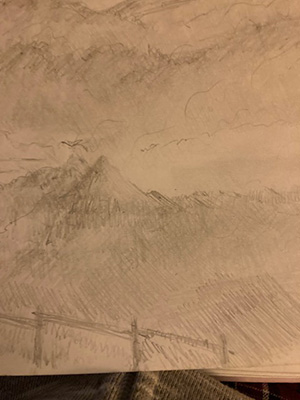
It’s important to understand that a stroke can be seen as an invisible illness; you can’t necessarily see it. The stroke survivor may look great, but inside, they may not feel so great. Share on X
You said the depression afterward of a new way of living. I did a little research about some suggestions on what people can say. I align with these. I like them. I’ll read them out. “Thanks for sharing with me. How’s your recovery going? Are you comfortable talking about it? Is there any way I can support you? Is there anything you want me to know? I’m here for you.”
Please stop saying that you also forget things because you’re getting older or going through menopause because that’s not what this is. That happens over time. This was overnight. I would like to talk a little bit about the depression that happens. Peter, I love how you’re flipping it to a silver lining. What I heard was you were on a hamster wheel. This stopped you and made you rethink life, especially with that experience. Tell us more. How are you living your daily life? Are you back at work?
No. My balance issues are so prevalent that I can’t get back to work. During this period of rehabilitation and trying to get back to normal, my license expired so I can’t drive. I’m at the mercy of the caregivers. That has impacted my ability to clear my thoughts. I’ll never take for granted the tremendous amount of freedom I had. If I wanted to go to a restaurant and pick something up to eat, I did it anytime I wanted. The freedom is gone. In many respects, I could look at it like, “It’s a jail sentence. There’s no bail. Maybe if I work at it real hard, I can get out of here a little early and have good behavior.”
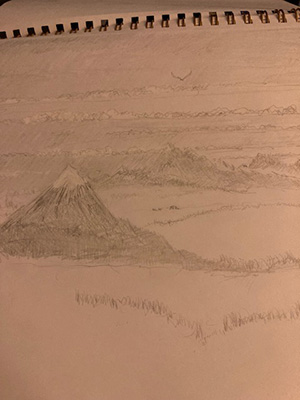
It’s as close to being in prison as you could get. There are all kinds of things I can do. I used to schedule a lot when I was a kid. It was a great pastime. I’m the only child. I had no brother or sister to pick on or get picked on by. I learned how to draw. I’m back to doing that and it’s fun. It’s not only fun but it’s a good exercise to work your noodle. Also with any luck, I’ll build a portfolio and maybe make some money selling these things. I don’t know. I probably won’t make a ton of money. I’m no Picasso but you never know.
I would buy one. I’ve seen your work.
One thing I found very therapeutic was paint by numbers.
You’re using your eyesight, brain, and perception. You have to take all of that and then tell your hand what to do. To me, it’s refreshing. It’s a great hobby, more so than reading, for example.
Molly, you’ve been with stroke survivors who start embarking on other areas of their lives and slow down and adjust.
It’s only in this role of mine that I’ve started to see what patients do after their recovery. I’ve worked only in ICU so I only see that acute time. In all those years, I didn’t know if they embarked on something different. There have been a few patients who have taken up some different hobbies but nothing major. Peter’s art will take off.
They’re trying to figure out where their strengths are, what they’re doing, and also trying to see, “Is vision a problem of mine now? How does that impact my hobby?” It’s hard for everyone to find something like that, though. I’m so glad you have, Peter. You are stuck sometimes, can’t drive, or have a disability of some type. It can be harder rather than easier to find something like that, unfortunately.
Peter, what is your prognosis? What did the doctors tell you? Will you regain strength if you keep working at it?
They’re not 100% sure. Everybody’s a little different. Their feeling is I’ll continue to get stronger and redevelop the balance because my vestibular system was thrown off by this whole process and being bedridden for almost three months. That takes its toll on your muscles atrophy. It takes a while but it’s the balance that is the biggest issue. I wear contacts.
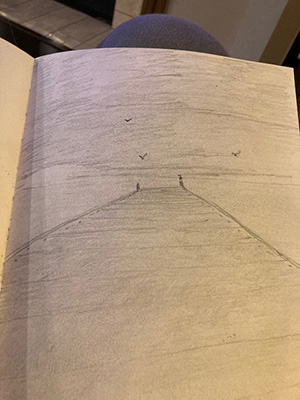
As a side note, sometimes necessity is the mother of invention. I can’t draw unless I have my contacts in, or I could but it would look like caveman art. The point is I had to learn how to put my contacts in and do it with 1 hand instead of the 2. I’ve gotten to a point where I can squeeze the water bottle with my left hand. When I put the contact in, there’s a wetting solution on the lens. The lens is on my one finger. I put each lens using my two fingers. I never thought I’d be able to do that.
When I was in the hospital, I thought I was a dead man because I couldn’t get these contacts in. Who’s going to do it for me? You’ll learn. If I had had a stroke, I would want to hear, “Don’t worry. Don’t panic.” When the therapist comes in and says, “We’re going to get dressed,” your first thought is, “How am I going to do that?” They have a device like the stick with the hook on there. It is helpful. First of all, everything you do after a stroke is going to require more energy. From thinking to worrying about going from point A to point B, it’s pretty amazing and yet you do. I hate when those pop-up buttons come up on your screen while you’re on a Zoom call or your system’s going to reboot.
It’s like our bodies are rebooting. I was awake the whole time but when my body started to work again, when I tried to describe to people what it felt like, it felt like a computer was shut off. It was on snooze. All of a sudden, it was rebooted but wasn’t back yet. What I found that I had to do for myself is I have to take time and have grace, space, and calm. I slept a lot. I remember being upset that I was sleeping.
I’d get up, walk the dog, come back, fall asleep for four hours, and think, “It’s the day.” I’d still fall asleep at night. Maybe one of my doctors or neurologists said, “Your brain needs rest like a baby’s brain. You need to sleep. Your body will tell you when it doesn’t need it anymore.” That sentence, “Listen to your body and what it needs,” is so crucial to do. It takes time.
Listen to what your body needs. It takes time. Give yourself grace and space to heal. Share on XI’m worried about myself because I had speech and memory processing therapy at Shirley Ryan, which is an amazing center here in Chicago. I stopped because I got frustrated. I went to about six sessions. I would be given a paragraph to read, flip the page, and then answer questions. I couldn’t remember the first question. I needed to look back.
Before the stroke, I was a teacher so I could remember all those things. I then got so depressed like, “I can’t teach anymore,” which I can. I’m tutoring. I have to look back at stuff. I stopped and I’m worried like, “Is my brain going to atrophy if I don’t continue?” I have to get back at it but it’s important for you to keep busy, do what you feel comfortable doing, do what you enjoy, and have grace. Molly, do you agree?
One hundred percent. A lot of times, what I see is the people who come into the support group who have had strokes more recently want to know, “When am I going to get better? What is this and that? Should I be doing more or less therapy?” They’re trying to get control of the situation. What I’ve seen is the people who have had their strokes longer ago say, “It takes time.” You have to give yourself grace. It’s not going to happen overnight. Continue with your therapies and what your doctors recommend. Keep up with all of that. Have time for yourself also. You’ll start seeing some improvements and progress. I agree with that.

If you’re suffering from depression afterward or in general because life is hard, please seek help. There are always hotlines and support groups. There are therapists. Everyone’s different but you can go on medication if you feel comfortable doing that. Talk to someone. There’s always someone there. What I loved was meeting you both in the stroke support group. You’ve helped lift me, move forward, and understand that I’m not alone. Whatever level of stroke that we’re all at, we get it. You need that validation and encouragement, and for people to inspire you to understand. It’s hard but we’re all going to be okay. Let’s take time. I want to thank you both for joining me.
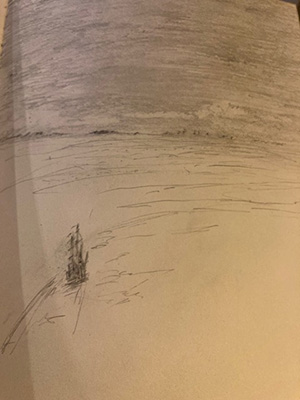
We always end the show by showing something that makes us happy. It could be an object or a ritual. Think for a minute. I’m going to talk about mine. If he lets me, I’m going to pick him up. I have a puppy, Archer. He was with me in New Orleans when we were visiting my daughter. When I came back and I would sleep all those hours, he would sleep next to me on the bed.
They say that animals can sense what a person’s going through. He would come right up to me and lick my cheek like, “Are you okay?” He understood. If you’re a pet lover out there, know that they’re so wonderful to have around. If you’re a struggling survivor, you might want to get a pet to help you do it. What is a ritual, someone, or something that you love or that’s helped you through?
I have a dog who’s sleeping on the floor. He’s a golden retriever. He’s got those bushy pants and tail. He looks a little like a big fox or a squirrel but he has been terrific. He’ll even walk around in the morning to make sure I don’t go down the stairs by myself. He’s as close to a comfort dog as you can get. He does make me smile and he knows it. I wish I could take him for a walk. That’ll be the goal for the summer of 2024.
I’m going to meet you and bring my dog to come to you. We’re going to have a little doggy stroke survivor play.
It sounds like a plan. That’s awesome.
I’d like to meet your wife. She’s incredible helping you the way that she has been.
She has done a great job and it’s not easy.
Molly, tell us what you love. What’s something that you are passionate about?
Going along with the theme, I have a son. My husband and I have been together for a long time. They, and also my extended family, parents, and sister, have been an incredible support to me along the way in my life but my dog is the number one. He’s a Bernese Mountain Dog Poodle Mix because I’m allergic to dogs. When I was pregnant with my son, he was at my feet when I was having that morning sickness and other difficult times in my life.
I never owned a dog before this dog but it is amazing what they sense and when something is going on. You may not necessarily be visibly crying. They know the tone in your voice and that something’s different. They are right there. He’ll start looking at my face or pawing at me, wagging his tail, and trying to cheer me up. That is something that I never thought would have such an impact on my life. It is amazing what they can do. I’ve tried to see if he could be a therapy dog because I was so struck by, “Is that your dog? Bring it a little closer.”
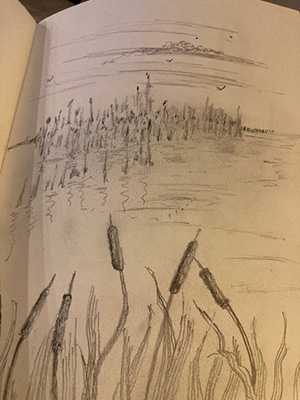
It is amazing how animals can sense how you’re feeling. When I travel, I bring him with me. It’s the security of knowing that he’s close by. I’m very helpful for that. Thank you both so much. Is there anything else that you’d like to add that we didn’t cover in this episode that maybe you’d like to share or encourage?
For any kind of stroke survivor or caregiver of a stroke survivor, there are so many resources. They might come from the state or the greater community. Look at university hospitals or hospitals in general. It may not be the one that you got taken care of after your stroke but they will have a lot of resources for anybody. Whether it’s getting back into the workforce, there’s some vocational assistance in our state, which I’m sure is in other states, as well as support groups. Ours is always able to join. It’s for anybody anywhere. That goes along with anything else that you’re dealing with. There are so many resources out there for you so don’t think that you’re alone.
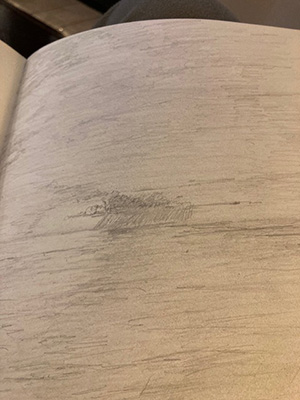
That’s the biggest message. You’re not alone. If you want to contact me, it’s KarenPulver@Yahoo.com. I can help connect you, if you’re in the Chicago area, to the stroke support group that I joined, as well as other resources. I’m happy to share. Peter, how about you? Is there any last message that you’d like to share with the audience?
It’s so critical. I’ve talked about it before. On that note, Karen, thank you so much for putting this together. You can’t have enough resources when something life-changing happens. I couldn’t imagine the outcome had the support group not been there. Call. Molly, thank you for hosting that group. It’s nice. My email is PeteKrammer1963@ME.com. I get the email there. Thanks so much, everybody.
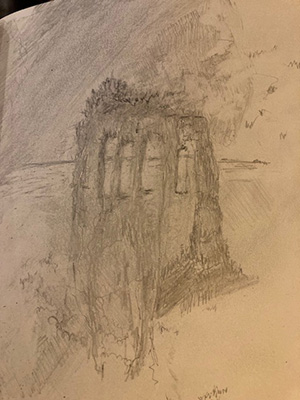
Thank you for putting this together, Karen, and for inviting us. I’m so glad I was able to meet you both through the support group. I’m happy to help in any way that I can. Get in contact with Karen to get in contact with me.
Thanks, Karen.
Important Links
- First Episode – Past episode
- KarenPulver@Yahoo.com
- PeteKrammer1963@ME.com
About Peter Krammer
 I hail from the south side of Chicago.
I hail from the south side of Chicago.
My family relocated from farm country in central WI. The grandparents that worked on their family farms were directly affected by the Great Depression and Dust Bowl days. They settled in a part of the country where much needed jobs were as common as train crossings.
My Dad left my Mom in the early days of my youth. I soon became the responsibility of my maternal grandparents. That would be instrumental in my being shaped as a young man/ only child.
Their perspective was genuine, caring, wise, and grounded in faith and the golden rule.
Their upbringing was a fine balance between love yet not being spoiled. I was never hungry or unclothed, in need of anything I needed, yet rarely given what I wanted.
I barely got through high school. I was often a class clown and real troublemaker. If not for shop class, in particular auto mechanics, I’d still be in high school. I was a direct benefactor of high school level vocational programs.
In any case, I ended up attending classes at a community college. My 1.5 GPA was not as concerning to the College of DuPage as other four-year institutions.
It turned out well for me though. I enjoyed not being told what to do and when to do it. Having no bridal was liberating to me. I could work and then attend classes of my choosing. I ended up graduating with a B average, just good enough to be accepted by Loyola University in Chicago.
I transferred there as a junior in college I continued on my path of being a avid student and good test taker. I graduated Loyola with Magna Cum Laude rankings with a degree in Political Science. I was really very interested in attending law school, with a particular interest in international relations/ business.
It was the mid 80’s, and with the popularity of ‘LA Law’ on NBC, everyone that graduated seemingly wanted to be a lawyer. I was quite uneasy about going to law school, despite my high GPA and interest in legal affairs.
So, I was ripe for the picking for the job force. I landed a job at the nation’s largest, most well-known discount commodity firm in Chicago. It was there that I learned about the importance of detail and accuracy. Particularly as they relate to money and speculation.
It took me a year or two to see the benefits of being in sales. Basically, I realized that sales is where the real money was being made.
Once I had a year of experience, I thought I would try my hand at being a stockbroker.
I was accepted to the Prudential Securities training program.
Success came easy. I had started to take on clients who I got to know at the discount house. I added clients of my own too. But the real break happened courtesy of my stepdad, for one day he decided to finally give up on dealing with winters in Chicago.
Once he retired, I was granted access to his client base and because they knew me from the time I was choosing food items from the kids menu.
Soon I was part of the 5% of all people who entered the business and succeeded.
Early on I learned two very important lessons when it comes to investing. First off, investing is a long-term proposition. Nothing worthwhile comes easy and fast.
The second most important lesson is quite simply this: significant, life-changing amounts of money are not made by investing in a bunch of diverse mutual funds. Instead, it’s done by investing in good individual companies via common stocks The key to success is knowing just which companies to invest in.
Here’s where the story takes a turn, going from a string of certainty and self-centered successes, to one of love and sharing a life with someone I got comfortable knowing and being with. Within a year of meeting Paige, we were married. Because my parents didn’t get along and despised each other, Paige and I eloped in the US Virgin Islands; our ceremony took place on the beach. Quite a wonderful experience and place.
We then focused on having a family. Easier said than done as Paige underwent two miscarriages. It was a tough time indeed, but we made up for it once our daughter Carly and son Luke were born…just 18 months apart.
Shortly after Carly’s birth, I was asked by my office Manager, to entertain the thought of going into the ranks of office management, thereby leaving the world of commissions all together.
Given the fact we just had our first child and a new mortgage, I took the bait. At that point we’d have a stable income as opposed to starting at $0 the first day of a new month.
The only catch is we’d need to relocate to north New Jersey, specifically the home of Frank Sinatra and where the first organized game of baseball took place, Hoboken NJ.
My job involved training those that were new to the business of providing financial advice. The days were long; however, the weekends were ours. We often went into Manhattan to experience all NYC had to offer.
I did well as a trainer/coach. I was able to parlay my success and become Sales Manager of the entire state of MN, Yet, as before, we had to relocate for the new position.
We enjoyed MN despite being there for two winters and one summer. Yet, we all survived the life-threatening air temperatures and Holi dazzle Parades.
With the help of the Manager who I reported to, I was able to return home to Chicago, becoming the co branch Manager of the office that I hailed from as a broker. I thought my traveling days were over when I was called upon to run the Milwaukee office-located a stone’s throw from the Miller Brewing Company. While I was moving around the country, hopping from one steppingstone to another within the firm, the firm itself was changing. After one of Europe’s largest and oldest banks took over the long-time white shoe firm of PaineWebber, the corporate culture changed. Long time associates I got to know as an advisor and trainer/coach left the ranks for greener pastures.
Within a few years, I too looked for a way out. Plan B required no move of family, just my coat rack and desk chair. I found a new alternative to the major Euro based bank in the form of a much smaller, and aggressive financial service firm based in NJ.
I was called on to run the largest office they had outside of NJ. One of the reasons why I’d join such a small firm was the potential to get equity shares once they went public. Remember the two rules to successful investing I mentioned earlier.
Yet, to my surprise, within a year of joining, the firm was sold to a small investment firm based in St. Louis that was already publicly traded. My tenure there was fruitful. In the decade I was there, I achieved all sorts of success, yet the most rewarding aspect was in being able to ground the family. We lived in the same home in Plainfield for ten years, and the affect was a real positive for Carly, Luke, and Boomer (our big black lab we were blessed by sharing 14 years with). While many of the farm fields became new subdivisions and business buildings, we all got to establish roots in the community.
This now leads to more life lessons worth noting: firm/company cultures change, people usually don’t. That said, when the culture changed, I looked for another Plan B.
I found the answer in another St. Louis based firm, run by some of the nicest and sincere people in the industry. I know what you’re thinking about now: When did St. Louis become the financial hub of this country?
As for when I’ll wrap this up, here goes. The second life lesson learned is simply this: To be successful, you need to be sincere and genuine, AND have the capital to make the things happen that you want to make happen.
After three years of working with a firm with a huge heart, but unfortunately that had the least capital, I was convinced by a friend and someone that I respected, to join one of the nation’s largest and oldest banks. The role he offered was branch office manager of their Orland Park office. Talk about full circle: remember I mentioned the family relocated to the south side of Chicago. Many folks refer to Orland and the surrounding towns as ‘the south side’.
I moved firms and as a family, we moved to Naperville, IL. With the downsizing, we took on a new dog. We named this golden retriever: Indy.
Within a couple of years with this latest, and with any luck, last firm, I set about changing the culture of the branch. It was a challenging role, but one of the most rewarding.
I led my branch of 17 Financial Advisors and 6 staff members through the Covid 19 pandemic, a major remodeling of the office, and having two bouts of Covid 19. Yet, on Feb 10, 2022. My life changed forever.
After a good day in the office, I returned home and watched a bit of television. Not too long after going to bed, I suddenly felt very strange. What I did not realize was an artery in my head split open.
I suffered none of the symptoms often associated with stroke. All I could do was tell my wife I was about to pass out. The pain was excruciating. I got rushed to a local hospital. After two stents were put in place, the bleeding resumed. I was rushed into emergency surgery.
Unfortunately, I suffered a stroke. Once I was aware of what happened, I realized that the stroke affected my left side and ability to swallow. While in the hospital, I contracted pneumonia which then led to a tracheotomy. After spending several weeks on the mend at the local hospital, my wife and close confidant got me transferred to Shirley Ryan Ability Lab in Chicago. There, I spent another two months. I returned home in June of 2023. I have been recovering ever since,
I am dealing with post stroke depression and re-learning to walk.
About Molly Pretet
 Molly Pretet is from the Chicagoland area and has been a nurse for 15 years. She is currently a stroke program coordinator at an area hospital. Molly enjoys time with family, friends, and anything Iowa Hawkeye related!
Molly Pretet is from the Chicagoland area and has been a nurse for 15 years. She is currently a stroke program coordinator at an area hospital. Molly enjoys time with family, friends, and anything Iowa Hawkeye related!
